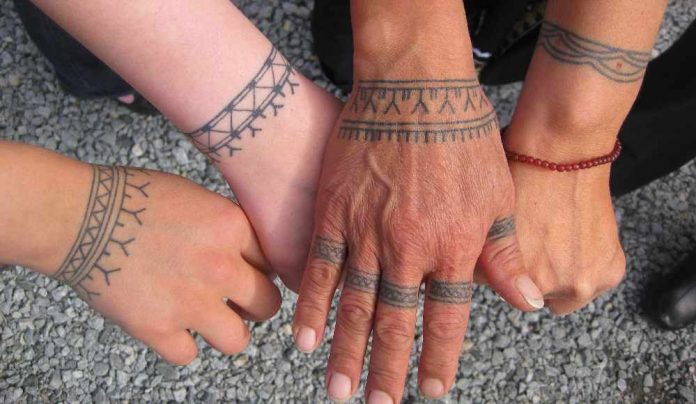Destination values, native heritage, and cultural identity are what we advocate for in our own particular way of safeguarding all reasons to love Aruba. Etnia Nativa, through this cultural blog, “Island-Insight,” shares native cultural awareness, educates, and safeguards native heritage. It is how we encourage you to experiment with an island-keeper state of mind during your stay.
In this episode, we present the art of tattooing and learn where we believe it all began. Our forefathers also practiced this art in Aruba many years ago; instead of needles, men tattooed their skin with cactus thorns and black pigment obtained by crushing charcoal into a fine powder and mixing it with water. Carbon gave a deep blue color under the skin.
Indigenous people from different parts of the world were the precursors of body modification, either through piercings or through tattoos, so tribal tattoos are the very origin of the tattoo world. However, little is known about when or why this practice began. The oldest known skin drawings are the geometric motifs of the Ötzi mummy, who lived more than 5,000 years ago.
At the end of the nineteenth century, tattoos were considered taboo and a vulgar or barbaric practice, but the truth is that tattoos have had a significant influence and meaning among world tribes as well as those of Native American ancestry.So if you are searching for inspiration for your next tattoo, the art of Etnia Nativa can offer you motives in every striking design.
In North America, indigenous women often used their tattoos as a form of seduction, while men used them as a symbol of conquest, strength, or power in wars or battles. One of the great motivations that led the indigenous people to tattoo their bodies was to record the enemies they had killed by drawing symbols that indicated the amount, and it was a type of tattoo that they used to wear on their thighs. Some tribes only allowed their members to get tattoos after they had killed their first enemy.
In general, men used to have tattooed symbols of war such as axes, arrows, or sticks. But only the best warriors had the privilege of wearing the best tattoos, which were symbols of pride and recognition for the public. This included back and chest tattoos, most notably a drawing of a sacred item or deity like a stone knife or the tribe’s ceremonial pipes, etc.
For the Mayans, it was also customary to use tattoos as a symbol of war. Their designs were based on drawings of animals such as monkeys, jaguars, snakes, and eagles. The number of tattoos that were possessed indicated the hierarchy and status of the particular warrior. So a good warrior should have practically his entire body covered.
The Inca tattoos consisted of some geometric and some abstract descriptions of the daily utensils they used. The ceramic design found on multiple vessels discovered in different regions of Peru depicts motifs that were later discovered as tattoos on mummies. Zigzag elements or animal engravings were the most common.
But how did the native people get their tattoos? Archaeologists from Washington State University have discovered a 2,000-year-old tool known as the “Pueblo Needle” in southeastern present-day Utah, belonging to the Anasazi culture. The pen-sized tool has a handle about nine centimeters (3.5 inches) long made of sumac wood, tied at the end with shrub leaves (Rhus trilobata) and some cactus spines with carbon spots on their tips, a detail that caught the attention of archaeologists.
Intrigued by Aruba`s origins and its cultural heritage? Then we encourage you to do something outside of the tourist grid and become the exclusive visitors of Etnia Nativa, a private encounter set up where you will be able to touch and be touched by authentic Aruba heritage, a spectacle of native art, archaic as well as archaeological artifacts, lithic tools, colonial furniture, and other items of the island’s bygone era. Get inside a recycled environment full of peace, relaxation, and knowledgeable Native stories.
Etnia Nativa has been, since 1994, the home of science and an acclaimed columnist, artist, and craftsman who guides and lectures you through his resplendent collection. The landmark Etnia Nativa provides an authentic glimpse into Aruba’s native cultural heritage. Something completely unique, a modern Native Aruba experience!
Appointment is required + 297 592 2702 or etnianativa03@gmail.com




















